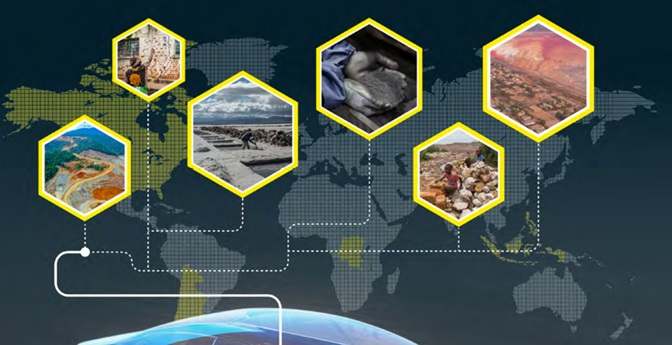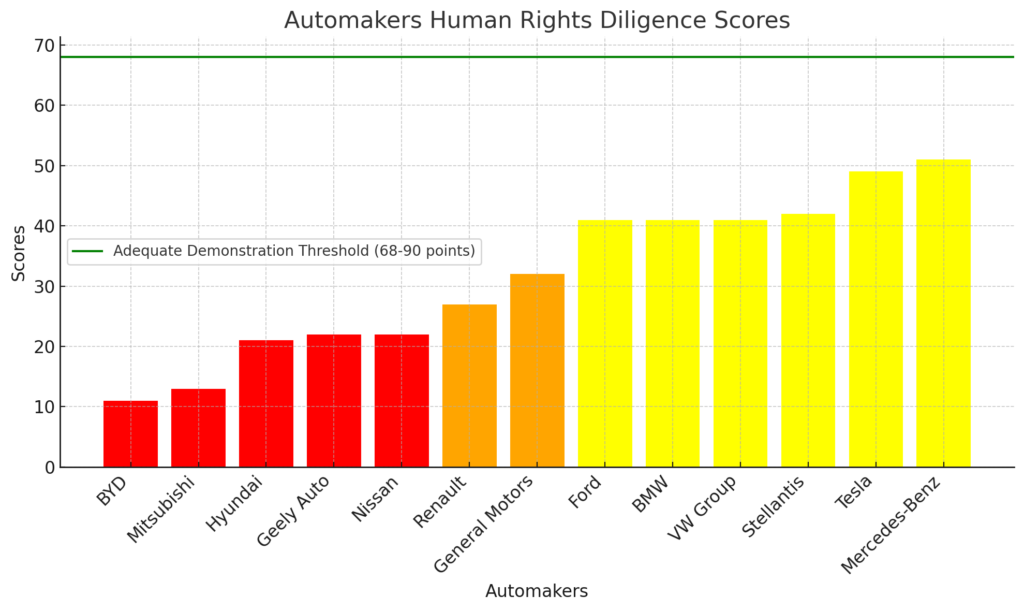The growth of electric vehicle (EV) manufacturing brings with it concerns beyond technology and sustainability—human rights issues are increasingly under the spotlight, especially with the industry’s rising demand for metals critical to battery production. Amnesty International recently acknowledged Tesla and Mercedes-Benz for their efforts in addressing these human rights issues, though their report emphasizes that a significant gap remains in fully meeting ethical standards.

EV Manufacturing and Human Rights: A Complex Landscape
While electric vehicles are championed for their environmental benefits, particularly in reducing greenhouse gas emissions, their supply chains pose unique ethical dilemmas. To produce batteries, automakers require metals like cobalt, lithium, and nickel, which are often sourced from regions where mining conditions are hazardous and exploitative.
The Democratic Republic of the Congo (DRC) is a focal point of these concerns, producing approximately 70% of the world’s cobalt. Unfortunately, the country has a history of dangerous mining practices, sometimes involving child labor and exposing workers to harmful conditions. Amnesty International’s latest report sheds light on the strides made by some automakers to improve transparency and adopt human rights standards. However, the report also makes clear that the industry as a whole still has much work to do.
Progress in Human Rights Diligence
In 2017, Amnesty International highlighted human rights risks within EV battery supply chains, prompting some automakers to rethink their sourcing and production policies. Since then, the organization has seen encouraging steps, such as companies conducting risk assessments for minerals used in EV batteries, meeting with affected communities, and working with civil society groups to establish ethical frameworks.
Tesla and Mercedes-Benz have been noted for their leadership in human rights diligence among EV manufacturers. Despite this progress, Amnesty stresses that both companies, while ahead of their competitors, still have room to improve in fully demonstrating human rights diligence in their supply chains. In contrast, the report criticizes companies like BYD and Mitsubishi, whose human rights efforts lag behind.
Key Areas of Concern in EV Metal Mining
Amnesty International’s report outlines several regions where the mining of critical EV minerals has led to significant environmental and human rights challenges:
- Democratic Republic of the Congo (DRC): Mining here produces cobalt essential for EV batteries, but has also resulted in serious human rights abuses. People in Kolwezi, a major mining hub, have been displaced from their homes and farmland, and mining pollution has had dire impacts on local health. Amnesty considers these areas “sacrifice zones” due to the extent of human and environmental suffering involved.
- Lithium Triangle (Argentina, Chile, Bolivia): In South America’s lithium-rich regions, Indigenous communities report that lithium extraction threatens their way of life by depleting water resources and disregarding their rights to control economic activities on their lands.
- Indonesia: Extensive nickel mining, especially on Halmahera Island, has displaced communities, stripped forests, and contaminated rivers and seas, disrupting Indigenous peoples’ lives and damaging ecosystems.
- Philippines: Nickel mining has generated significant environmental pollution, including air and water contamination and damage to aquatic habitats. Health problems, such as respiratory issues and cancers, have been linked to these mining activities.
- Global Impact on Marginalized Communities: Across the globe, agricultural, racialized, and Indigenous communities face the brunt of environmental pollution and climate change. These communities often live near extraction projects and bear the consequences of “environmental racism,” which subjects them to air and water contamination, reduced food security, and limited healthcare access.
- Risks for Human Rights Defenders: Advocating for environmental and human rights protection can be dangerous. Amnesty’s 2024 State of the World’s Human Rights report highlights that Indigenous people and environmental activists face severe risks, including criminalization, excessive force, and sometimes even violence. Between 2010 and 2021, the Business and Human Rights Resource Centre reported 148 attacks on human rights defenders related to mineral mining.
The Role of Automakers and the “Battery Passport” Solution
Automakers have a significant responsibility in mitigating human rights abuses related to EV battery production. Tesla and Mercedes-Benz have set examples by adopting human rights diligence policies, but the report stresses that these efforts need to go further and be more consistent across the industry.
One promising development in enhancing supply chain transparency is the introduction of a “battery passport.” This tracking system is designed to follow the lifecycle of battery materials from their source to their final application in EVs, allowing automakers to verify the ethical sourcing of metals. By improving traceability, the battery passport can help ensure that mining practices align with international human rights standards and environmental guidelines.
The Path Forward: Human Rights and Environmental Standards for EVs
The transition to electric vehicles is a critical step in combating climate change, but it should not come at the expense of human rights. Automakers can take several measures to balance the demand for critical minerals with ethical practices:
- Transparent Supply Chains: Companies should implement rigorous monitoring systems to ensure that all materials used in their batteries are sourced responsibly. By adopting technologies like blockchain, automakers can enhance supply chain visibility and trace each metal back to its origin.
- Collaborative Efforts with Local Communities: Automakers should prioritize working with local communities affected by mining operations, ensuring that these people have a say in how resources are used on their lands. Such collaborations are crucial for maintaining the balance between development and local well-being.
- Support for Human Rights Defenders: As environmental activists and Indigenous leaders continue to face risks, automakers should advocate for and support protections for these individuals. This might include partnerships with human rights organizations and policies to protect defenders’ rights.
- Industry-Wide Standards: Creating industry-wide standards for human rights and environmental protection in EV manufacturing would help ensure consistency. Organizations like Amnesty International can collaborate with automakers to develop guidelines that meet global human rights standards.

Here’s a bar graph illustrating the human rights diligence scores of automakers based on the given data. The color-coding reflects Amnesty International’s classification:
- Red (0-22 points): No demonstration of alignment with human rights diligence (BYD, Mitsubishi, Hyundai, Geely Auto, Nissan).
- Orange (23-40 points): Minimal demonstration (Renault, General Motors).
- Yellow (41-67 points): Moderate demonstration (Ford, BMW, VW Group, Stellantis, Tesla).
- Green (68-90 points): Adequate demonstration threshold (no automakers reached this level).
This graph provides a clear visual comparison of how these companies perform in terms of their commitment to human rights diligence in supply chains.
Tesla, Mercedes-Benz, BYD, and Mitsubishi
| Automaker | Human Rights Diligence Efforts | Ranking by Amnesty International |
|---|---|---|
| Tesla | Strong human rights policies, improvements in traceability | Leading among automakers |
| Mercedes-Benz | Effective policies with room for improvement | Leading among automakers |
| BYD | Limited actions toward human rights diligence | Lagging |
| Mitsubishi | Minimal efforts in human rights diligence | Lagging |
Striking a Balance in EV Manufacturing
As the EV industry continues to grow, ethical production must be a central focus. Tesla and Mercedes-Benz’s efforts, while commendable, underscore the need for ongoing diligence and industry-wide collaboration. The challenges highlighted by Amnesty International offer a roadmap for automakers: by prioritizing human rights and environmental stewardship, the EV industry can fulfill its promise of sustainability, not only for the planet but for the people who inhabit it.
Related Post
